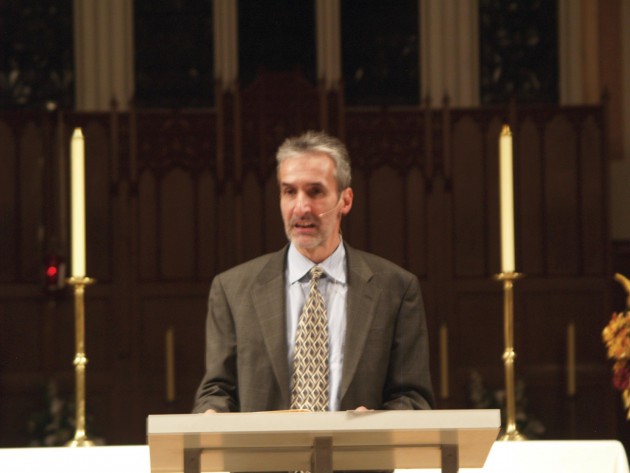
As the first Mormon Republican nominee for president, Mitt Romney hasn't taken advantage of his position to curb negative stereotypes of his religion. At least, that's what Columbia University professor and New York Times columnist Samuel Freedman claims.
In Tuesday's 2012 Mendenhall Lecture, Freedman, who writes a bi-weekly column for The New York Times called "On Religion," spoke about how religion interacts with politics. One of the focuses of the speech was that Mormons have been placed on the fringes of American culture, and that this election was a chance for the group to join the American mainstream. Through Mitt Romney's campaign, Freedman sees an opportunity to "change the stereotypes the left has created."
Freedman used Al Smith's 1928 and John F. Kennedy's 1960 presidential campaigns as support for his ideas about the potential of Romney's campaign. Both Smith and Kennedy were Catholic candidates who ran at a time when voters held strong anti-Catholic sentiments, and both candidates used their campaigns as a chance to alleviate those sentiments. If they could speak out in defense of their religion, Freedman asked, why can't Romney speak out in defense of his?
"I'm yearning for Romney to give the speech he has not given about Mormons and who Mormons are," Freedman said.
Freedman said the Church of Jesus Christ of Latter-Day Saints is going through changes as its missionaries go abroad and return with new views about the world and other cultures and races.
He cited the retraction of the church's teaching that said African-Americans could not be priests within their religion and the building of Mormon churches in Harlem as examples of such change.
"These stories could have been told [during the campaign], but weren't," Freedman said.
Some students who attended the lecture were not convinced of Freedman's argument that Romney should discuss Mormonism. Junior Zach Crenshaw felt that such a speech would not be appropriate since Romney's platform is based on the economy, not his religious beliefs.
"Backlash for such a speech would have been prevalent, and it would have cost him votes," Crenshaw said.
Sophomore Meredith Lockman would agree with Crenshaw.
"The presidential platform is not a chance for religious discussion," Lockman said. "If someone asked him about [Mormonism], then go for it, but otherwise it isn't relevant."
In the question and answer portion of the talk, Freedman gave his thoughts about the importance of separation between church and state. He said that while the separation is vital to prevent one religious group from gaining total control, the intersection of religion and politics is valuable. It is for that reason, he argued, that religion deserves a public place, regardless of majority views about a particular religious group.
"Religion doesn't have to determine the vote," Freedman said. "But it deserves a place in the discussion."
Freedman finished his speech, with a quote from 1928 presidential candiate Al Smith to explain how the American public can decide what is important for themselves.
"The best way to kill anything un-American is to drag it out into the open because anything un-American cannot live in the sunlight," Freedman said.


